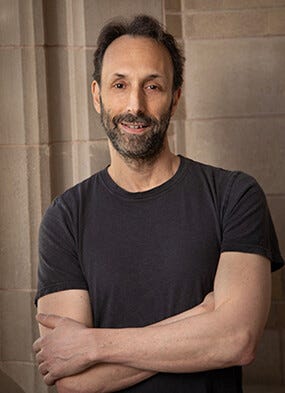#DogShirtTV: America's Last Undecided Voter
The day before Election Day, we'll see if he can make up his mind
Good Afternoon:
There is only one undecided voter left in these United States. Over the last few months, he has agonized on social media about which way he leans. He has occasionally seemed to come to a decision—on then to revert to undecided status at the next turn of the news.
On Election Eve, America’s last undecided voter—Yale Law School’s own Scott Shapiro—will join me on #DogShirtTV to discuss his last-minute thinking on Election 2024. He is threatening to bring a Powerpoint presentation to outline the factors that are on his mind.
I may also be bringing a special guest—one capable of a conducting America’s strangest focus group.
Here’s our discussion on the subject from four years ago:
If you have a question for Scott, want to lobby him on behalf of either candidate, or want to understand his thought process (if can even quite be called that), join us Monday at 4:00 pm on #DogShirtTV. Access to the studio for the live recording is available below the paywall. We will, of course, post the video and the audio on YouTube and on our podcast feed.
On a slightly more serious note, I released a long story yesterday on Lawfare of which I am very proud. My main role in this story—about a man named David Clements—is not as an author, though my byline is on the piece. The reporting for this lengthy feature story was overwhelmingly done by the estimable Anna Bower, and my main role in it was that of Anna’s editor—until, that is, she got stuck in jury duty just when it came time to interview Mr. Clements. The result was that I ended up stepping up on the reporting side to help get it over the finish line, as we didn’t know how long Anna would be tied up on a jury.
The story, entitled “David Clements: The Evangelist of Election Refusal,” opens:
In the final moments of the training exercise, dozens of people surrounded a woman who was shouting about defective voting machines.
They were shielding her from a sheriff’s deputy—or, rather, a man assigned to play the role of a sheriff’s deputy—who was trying to evict her from the faux event.
The trainees had been instructed that American elections are rigged and that they are battling a “spiritual war” against election fraud. They had been told that they could resist “tyranny” by showing up en masse to pressure local officials to withhold certification of voting machines or election results.
And at this climactic moment, at the direction of a former business law professor named David Clements, they were role-playing large-scale civil disobedience at a local elections meeting, crowding around a fellow comrade-in-arms to physically block law enforcement from removing her from a public meeting at which she was filibustering.
Later, Clements assured trainees that this is the only way to fight back: “You have to create a righteous, sober-minded, well-spoken, articulate mob, if you will, because that’s the only thing that will work short of where we’re headed, which is a kinetic civil war—if we don’t get this resolved peacefully.”
This scene unfolded during a day-long “election integrity” training event held in September inside the worship center at Grace Covenant church in Hogansville, Georgia, a small town in the westernmost part of the state. But thousands of people across the country have attended similar training sessions hosted by the former professor. The traveling event series has been billed as the “Gideon 300” tour—a reference to the biblical story of 300 men who faced an army of 135,000 and won.
Clements has described the “Gideon 300” project as an effort to mobilize 300 or more “warriors” in each county in the United States, meaning people who are willing to show up in large numbers at local elections meetings to speak against certification and who aren’t afraid “to die” or “to be arrested.” These “warriors,” Clements has said, must demand that local officials withhold certification of voting machines or election results. “Gideon 300” trainings typically involve a simulation of a county election board meeting, in which Clements demonstrates what the crowd should do if local officials won’t listen: hijack the public meeting by physically occupying the space, getting control of the microphone, and not giving it up based on what he believes to be “arbitrary” time limits put on speakers.
The “Gideon 300” tour is not the first time Clements has criss-crossed the country to evangelize about purported election fraud. He set out to persuade local officials to refuse certification long before the upcoming election, as the Washington Post and Reuters reported in 2022. Yet his recent activities have largely escaped notice in the lead-up to the Nov. 5 presidential election, even as commentators have sounded the alarm about the prospect that county officials in Georgia or elsewhere might refuse to certify the election. Withholding certification of election results at the local level is not lawful, and it is unlikely to work as a means of preventing the winner from taking office. That said, it could have destructive effects, sparking post-election chaos, misinformation, and possibly violence.
Lawfare reviewed dozens of photos, videos, and audio recordings of Clements as he has traveled from town to town across the country, simulating election certification meetings at which scores of people confront local officials and pressure them to withhold certification.
Last month, Lawfare also attended one of Clements’s trainings in Hogansville, where the charismatic lawyer used a combination of religion and conspiracy theories to promote lawlessness ahead of the upcoming election—lawlessness both on the part of the election officials whom Clements wants to refuse to certify results, and on the part of the “mob” he is training to pressure them.
In a lengthy interview on Oct. 29, Clements denied that he is encouraging lawlessness, much less violence. He insisted that local officials do, in fact, have the authority to withhold certification in the presence of suspected fraud; that all of the tactics he is teaching at his trainings are First Amendment-protected speech; that natural law theory countenances violations of mere state law to the extent that the latter infringes on fundamental human rights; that the risk of violence by police against him and other protesters far exceeds the risk of violence by the people he is training; and that police violence justifies uses of force by protesters.
“Here we are six days from the most consequential election of my lifetime,” Clements said during the interview. “And everyone’s preparing themselves for what could be a very, very kinetic situation in the months leading up to certification. And all of my efforts have not been to escalate rhetoric. It’s actually to diffuse, talk, use our words.”
But while insisting on their legality, Clements also acknowledged that his tactics might push the line in some instances and are, among other things, designed to set up challenges to restrictions on speech.
“In order to actually challenge these things in a court of law, you have to test the limits of where does the First Amendment start and stop,” he argued, “in order to communicate, I think, these concepts that have to be communicated.”
Clements agreed to speak on the condition that the interview be recorded and released in its entirety, noting by email in response to Lawfare’s request that, “Thus far, USA Today, Washington Post, NBC, and many others have been instructed not to go on record with me for a fully transparent interview.”
The full nearly-two-hour interview is available here:
A podcast on the story, hosted by the estimable Roger Parloff, is available here and clocks in at more manageable 53 minutes:
Today’s #BeastOfTheDay is a beluga who wants a scritch:
Keep reading with a 7-day free trial
Subscribe to Dog Shirt Daily to keep reading this post and get 7 days of free access to the full post archives.




